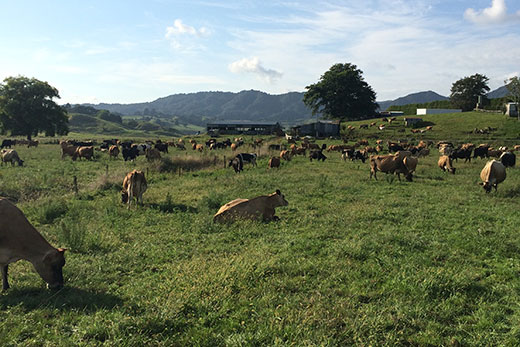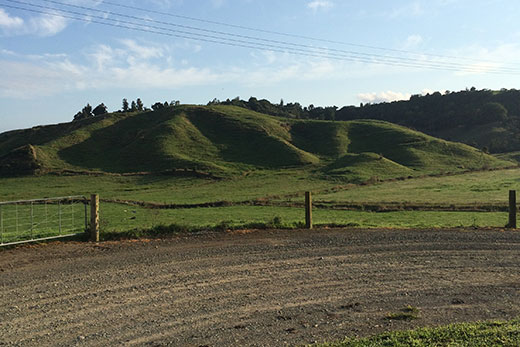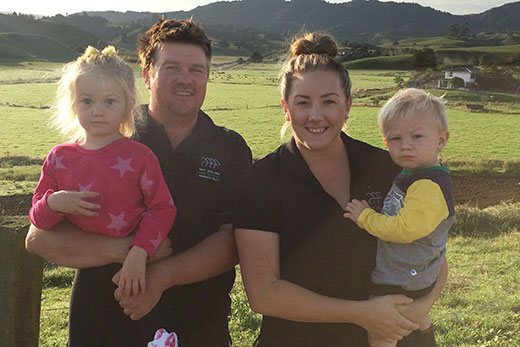Grant Thomson didn't know how to put cups on a cow when he decided his future lay in dairying.
'I was working on a sheep and beef farm but at 19 went to Telford Rural Polytechnic to learn about dairying because of the pathways it offered to farm ownership,” says Grant, who with wife Karley has won the 2015 Bay of Plenty Sharemilker/Equity Farmers of the Year Award.
Karley and Grant Thomson are the 2015 Bay of Plenty Sharemilker/Equity Farmers of the Year pictured with their children, Mischa, 3, and Lennox 18 months.
The couple also won the Ecolab Farm Dairy Hygiene Award, the Triplejump Risk Management Award and the LIC Recording and Productivity Award.
Karley grew up on a farm but trained as a beautician and worked in the industry before meeting Grant.
'He needed help in the shed when his herd went from once a day to twice a day milking so I helped out and never went back to beauty therapy,” says Karley who was 17 when she began milking cows.
Go bigger
When Grant graduated from Telford with a Dairy Certificate and Farm Management Certificate, his first job was on a farm at Tokoroa.
Later on Mike and Maxine Davey's farm he began training as a farm manager, going on to work for three seasons as a lower order sharemilker.
'We decided it was time to go bigger so went to milking 440 cows at Waitoa on a farm owned by Bruce and Pauline Luxton.”
The next move was to Opotiki where the couple are currently 50 per cent sharemilking (with a silent partner) 420 cows for Tom and Tony Trafford.
In June they will buy their silent partner out of the company and begin a 400-cow 50 per cent sharemilking position at Kiwitahi, near Morrinsville.

A herd of 420 cows graze on the Opotiki farm owned by Tom and Tony Trafford.
Effluent blocks
Farming at Opotiki has proved challenging and another learning curve. 'The farm is about 60 hectares flat, 20 rolling and tractor country, and 20 steep.
'There's quite a lot of paspalum on the flats and cows milk on it if it's well managed.
'However, we grow eight hectares of maize on effluent blocks to not only produce our own supplements but also get rid of paspalum before turning the paddocks back into pasture.”
'This year we'll produce around 22 tonne a hectare of maize which is slightly down on last year but it's still pretty good.”
Growing maize and reducing the amount of palm kernel brought in are two of the couple's low-cost strategies.
'One of our strengths is that we run a low-cost system which helps us to repay debt quickly so that we can make the next move.”
Their long-term goal is farm ownership in 10 years' time.

After maize is harvested from effluent blocks, the paddocks are re-sown in pasture in a programme to remove paspalum.
Discussion
Grant belongs to an Opotiki discussion group which has been helpful in comparing his business management with that of other farmers.
'Higher cost systems are a lot more work and for sharemilkers you need to supply all the equipment and labour that goes with those systems.
The end result, between higher input and lower inputs, is not much different.”
Grass growth begins earlier in Opotiki than many regions and Grant has brought calving forward to July 15 to take advance of the October pasture growth. 'We'll probably continue to calve early at Kiwitahi as the seasons seems to be getting earlier.”
Karley and Grant have two children, Mischa three and Lennox 18 months; and Karley runs an online children's wear business, Cherry Blossom Kids Boutique from home.
'It gives me another interest and I enjoy the contrast between farming and fashion – rough to tidy.”
The couple are looking forward to their next move, new challenges and being closer
to family.



0 comments
Leave a Comment
You must be logged in to make a comment.